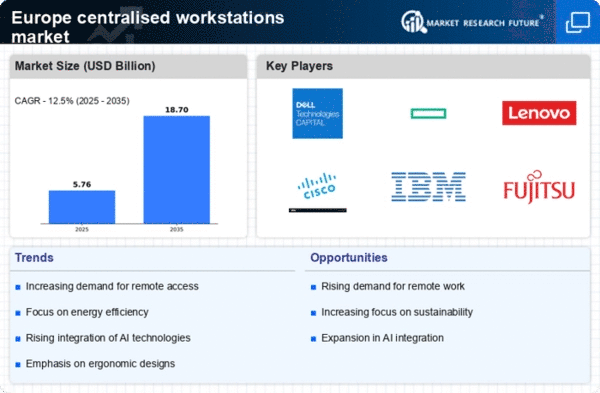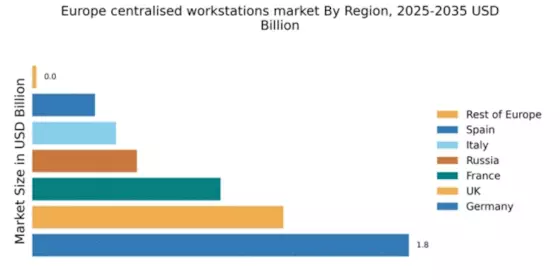Focus on Regulatory Compliance
In the context of the centralised workstations market, the emphasis on regulatory compliance is becoming increasingly critical for organizations operating in Europe. With stringent data protection regulations such as the General Data Protection Regulation (GDPR), businesses are compelled to adopt solutions that ensure compliance. Centralised workstations provide a controlled environment where data security measures can be effectively implemented, thereby reducing the risk of non-compliance. In 2025, it is estimated that 40% of companies will prioritize compliance-related investments, which will likely drive the demand for centralised workstations that offer robust security features. This focus on regulatory adherence not only protects organizations from potential fines but also enhances their reputation among clients and stakeholders.
Growing Emphasis on Cost Efficiency
Cost efficiency remains a pivotal driver in the centralised workstations market, particularly as organizations seek to optimize their operational expenditures. In 2025, it is projected that businesses will allocate approximately 20% of their IT budgets towards solutions that enhance cost-effectiveness. Centralised workstations can significantly reduce costs associated with hardware maintenance, software licensing, and energy consumption. By consolidating resources and centralizing management, organizations can achieve substantial savings while maintaining high performance levels. This focus on cost efficiency is likely to encourage more enterprises to invest in centralised workstations, as they seek to balance performance with budgetary constraints. Consequently, the centralised workstations market is expected to thrive as companies prioritize financial prudence.
Shift Towards Cloud-Based Solutions
The centralised workstations market is witnessing a significant shift towards cloud-based solutions, driven by the increasing need for flexibility and scalability in IT infrastructure. Organizations in Europe are increasingly migrating their operations to the cloud, which allows for easier access to applications and data from any location. This transition is supported by a 25% growth in cloud service adoption among enterprises in 2025. Centralised workstations equipped with cloud capabilities enable businesses to reduce hardware costs and improve data management efficiency. Furthermore, the ability to scale resources according to demand enhances operational agility, making cloud-integrated workstations an attractive option for many organizations. As a result, the centralised workstations market is likely to expand as more companies embrace cloud technologies.
Advancements in Technology and Innovation
The centralised workstations market is being propelled by rapid advancements in technology and innovation. As new technologies emerge, such as artificial intelligence and machine learning, organizations are increasingly looking to integrate these capabilities into their workstations. In 2025, it is anticipated that 35% of companies will invest in innovative technologies to enhance their operational efficiency. Centralised workstations that incorporate cutting-edge technologies can provide businesses with improved data analytics, automation, and enhanced user experiences. This trend not only boosts productivity but also positions organizations to remain competitive in a fast-evolving market. As a result, the centralised workstations market is likely to benefit from the continuous pursuit of technological advancements.
Rising Need for Enhanced Collaboration Tools
The centralised workstations market in Europe is experiencing a notable surge in demand for enhanced collaboration tools. As organizations increasingly adopt hybrid work models, the necessity for seamless communication and collaboration among remote and on-site employees becomes paramount. This trend is reflected in a reported 30% increase in investments towards collaborative technologies in 2025. Centralised workstations facilitate this by providing a unified platform where teams can interact, share resources, and manage projects efficiently. The integration of advanced software solutions within these workstations is likely to further drive their adoption, as businesses seek to improve productivity and streamline workflows. Consequently, the centralised workstations market is poised for growth as companies prioritize tools that foster teamwork and connectivity.

















